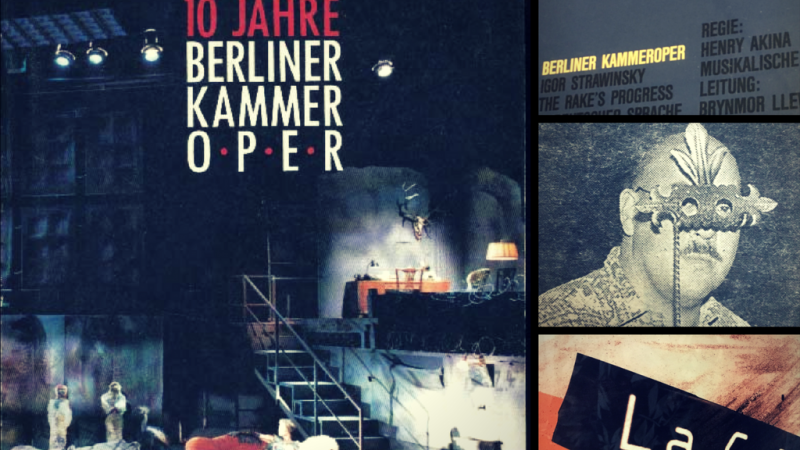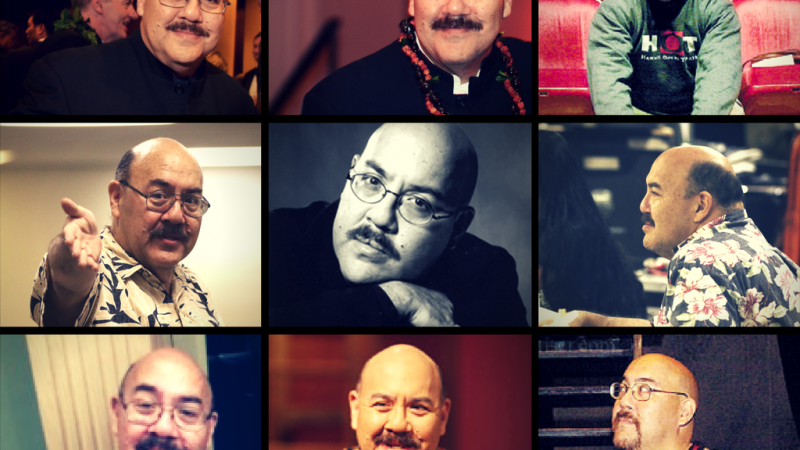A true love for music has guided Henry Akina, Hawaii Opera Theatre’s first Hawaiian director, through more than 120 operas over a 30-year career.
Offenbach’s The Tales of Hoffmann will be the last opera that Henry directs for HOT, before retiring from his role as Artistic Director, which he has held for 20 years. The production will be performed on April 21, 23, and 25 at the Blaisdell Concert Hall.
In a 2002 HOT concert program Henry wrote: “The opera is but one art form where we can go beyond everyday life to look at some of its mythologies and gain insight into the lives of other characters, and thus into our own.”
With this in mind, the Tales of Henry will look back on Henry’s life and career.
Rediscovering An Art Form
After receiving his Bachelor of Arts degree Magna cum Laude in Psychology and Drama from Tufts University in 1977, Henry made a decision that would change his life. He decided to move halfway around the world to Germany to attend the Free University of Berlin Graduate Program, where he could continue to study theater science by working as an assistant director.
“I got coffee, and I did all these other things,” Henry explained in a 2015 PBS interview, “but at that time I was an assistant for language particularly, because they needed someone who spoke English.”
Henry was on track for a successful theater career. But the Muse of Music was about to change everything.
“Opera as a career was pure happenstance,” Henry told a reporter during a 1998 MidWeek interview. “I was working as an intern in spoken theater, but they canceled the performance. But there was a performance of Faust with Barbara Daniels, and I was invited to work on that.”
The hands-on experience of working as a director’s assistant on an opera revitalized his interest in the art form that he was introduced to as a child. He started buying himself opera tickets and assisting on more opera productions. Henry still considered theater his main focus until he saw a production of Verdi’s Don Carlo at the Deutsche Oper Berlin.
“It was a kind of opera that I hadn’t seen before,” Henry said. “It was abstract and delightful. I can only tell you that it made me feel a lot. It took me to a place where I had never been before. Theater hadn’t really done that for me.”
And thus a love for opera was born. Music, Henry found, could heighten the emotion of theater.
He transitioned from working on theatrical sets to musical sets and learned the differences between staging actors and singers. The director, Henry told PBS, is there to “make things live for the singer.”
In the early 1980s, a class of opera singers and a pianist heard saw some of the pieces that Henry had directed and reached out to him with a proposition. They were interested in starting a company and wanted him to be its director.
Founding An Opera Company
Henry was surprised. The fact that they chose him out of any other director in the area puzzles him to this day, he said. But the choice didn’t come as a surprise to others.
“He had a commitment to the arts, he was very good at choosing the repertoire and finding the right artists, and people recognized that,” said Brynmor Llewelyn Jones, a conductor who was working in Berlin at the time. “When you get somebody like that to work with, you don’t ask many questions.” Henry and Brynmor co-founded the Berlin Chamber Opera in 1981, and with nothing more than eager singers, a pianist, and some stage lights, the group got to work.
The company developed a reputation for its alternative opera productions, ranging from early Baroque repertoire to contemporary works. The company received state funding only a couple years in, and its productions started selling out in the third year.
Henry directed over 50 opera productions in the following 15 years, including four world premieres. He attributed the company’s success at that time to the motivation of its people, which Brynmor described as “250 percent.”
“They were people who wanted to work,” Henry said. “That gives you a whole different kind of energy.”
Positive reviews poured in over the years. One local reporter called Henry “undeniably impressive” as a director in a 1993 review. But the company faced tough times, as well. In 1984, costume material caught fire onstage during a Mozart production. The venue had to be evacuated, but no one was injured. And in 1986, a turntable that was integral to a production malfunctioned onstage, forcing singers to improvise before the audience.
“There was enough balance and enough good stuff with that bad that kept it going, though,” Henry said.
Around that same time, Henry began teaching acting and performance skills to opera singers at the Conservatory of the Arts in West Berlin. He also started accepting offers to direct operas across Europe. But the Berlin Chamber Opera remained his priority.
“Berlin [Chamber Opera] was his baby,” Elsa Grima, Henry’s first Assistant Director, said. Henry met Elsa while he was directing Busoni’s Turandot at the Opéra National de Lyon in France and he invited her to Berlin to work with him. At the time, Elsa wasn’t confident about her directing abilities, but Henry saw potential in her.
“When I first met him I was just a beginner, and I thought I was so bad,” she said. “He believed in me before I believed in myself.”
Elsa worked with Henry on four productions at the Berlin Chamber Opera. She described his leadership as relaxed and fun, and she said his trust in her was “entire.” Henry was not only Elsa’s mentor, but a friend who she could spend time with outside of rehearsals.
“You don’t learn directing. You get inspired,” she said. Elsa worked with Henry for years before accepting a position as Stage Manager at the Paris Opera. She has also worked with Henry at Hawaii Opera Theatre as Stage Manager several times over the years, including last season’s production of A Midsummer Night’s Dream.
An Invitation
By the 1990s, Henry had lived in Germany longer than he had lived in Hawaii. But he thought about Hawaii often.
During one Berlin Chamber Opera production, Henry had directed a singer to dance with the audience in Monteverdi’s Il ballo delle ingrate. As he watched the opera from the audience’s perspective for the first time, the scene reminded him of something familiar. “It was kind of like a Luau,” Henry said.
He had been keeping up with opera in Hawaii and was impressed by many productions, but until a HOT board member reached out to him about the search for a new Director in 1996, he hadn’t considered returning.
“They put out a call into the wilderness, and I was ready to come home,” Henry told MidWeek. The invitation came at a time where Henry was already considering looking for something new. After the Berlin Wall fell in 1989, there was no expectation for funding for the Berlin Chamber Opera. Without funding, the company couldn’t go on.
“We both saw the writing on the wall,” Brynmor said. “The reaction here was one of understanding, but also sadness.”
Henry’s time in Germany gave him a love of opera, taught him about leading an opera company, and encouraged him to instruct others. He would take each of those lessons with him as he started his new journey as Director back in his island home.
By Allison Kronberg


